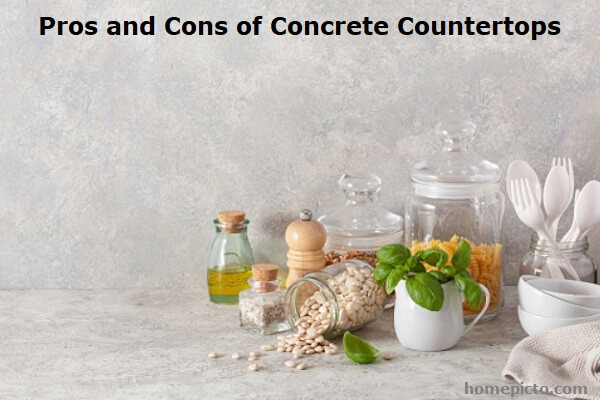In recent years, concrete countertops have gained a lot of popularity. Furthermore, the pattern will remain the same for a while. Therefore, these counters could give off a more industrial or rustic vibe. First, however, you should know a few Pros and Cons of Concrete Countertops if you consider getting them for your kitchen or bathroom.
Due to their complete customization and handcrafted nature, concrete countertops have recently become more and more popular in kitchens, bathrooms, outdoor gathering spaces, restaurants, and bars. Concrete countertops are best in comparison to marble and granite. Many homeowners find concrete countertops the ideal complement to their homes because of their precise measurements and excellent stains.
Currently, concrete countertops are very fashionable due to their stylish industrial appearance. Compared to standard materials like quartz or granite, they are sturdy and less expensive. Concrete countertops are popular among homes due to these benefits:
Roads, sidewalks, and home foundations are all built with concrete. It is one of the most challenging building materials on the market and can withstand the constant use and abuse of a busy kitchen. In addition, concrete counters should easily survive for decades with proper upkeep.
Depending on the shape and size of the countertop, installers can provide a smooth, seamless surface. Professionals can, however, use color-matched seam filler to eliminate the appearance of seams even on more extensive concrete counters.
Concrete counters can be simple to clean if fitted and sealed correctly. All you need is a soft cloth and some warm, soapy water. Never use abrasives or harsh cleaners for more intensive cleaning. Adhere to the contractor's directions and use a pH-balanced cleaning that won't damage the sealant. Apply the appropriate stone sealer to the countertops as the contractor directs yearly.
Concrete is such a flexible material that there are countless ways to design concrete worktops. Any shape or texture is possible. Through the use of stains, dyes, and specialist coatings, it can also be any hue. Additionally, homeowners can use fossils, tiling, reclaimed glass, or even shotgun shells.
Concrete countertops for kitchens and bathrooms have certain drawbacks in addition to their obvious benefits. The following problems are listed:
Concrete is a porous substance. It is prone to stains, scratches, and bacterial growth if unprotected. To avoid colors, you should frequently touch up the sealant and clean up spills immediately.
The sealer is the problem. Although the countertop sealant may not be heat resistant, concrete is. A hot pan could damage or fade the sealer if placed on a concrete counter. When speaking with a concrete contractor, discussing different sealers and how well they withstand heat damage is vital.
All concrete countertops have hairline fractures. Professional installers can reduce cracks, but they cannot prevent them altogether. The finished product's structural integrity is typically not compromised by crashes, which are frequently hardly perceptible.
We're not just discussing money here. Despite being a generally available and affordable material, installing these countertops by a professional can be pricey. Additionally, it takes 28 days for concrete countertops to cure completely. Another factor is the additional cost of any customization, including textures, stains, and finishes. Despite this, concrete countertops are still less expensive than quartz, granite, and marble.
Conclusion
People are excited to try something new, and concrete countertops are currently rather popular among those involved in kitchen remodeling and design. However, because of all its problems, not the least of which is the high price, it is unlikely that it will continue to be popular. Stay with quartz or granite for your kitchen countertops if you want a more accessible and cheaper build. For a price estimate, contact a reputable countertop expert in your region.

A concrete counter has several advantages besides looks. If properly maintained, concrete is incredibly durable and will last a lifetime. As long as sealed, it is simple to clean. They are scratch- and dent-resistant. They are also heat-resistant, so putting a hot skillet on top won't damage the counter. Because concrete is regarded as a premium material and will be a show-stopper in your kitchen, it will also raise the value of your house.
Before having concrete installed, there are a few drawbacks. They must first be adequately cared for, which entails resealing and waxing. Concrete is a porous substance, so if you don't do this, you risk spills discoloring it, which may be very difficult to clean up.The cost is another drawback. Although customizing is fantastic, it has a price. You'll pay more for concrete countertops since they need a lot of labor to build and install.
Concrete is unquestionably a material to consider if you want to replace your kitchen counters. You have a virtually limitless number of design options in addition to it being an extremely robust material that, with good maintenance, will survive for many decades. In addition, the counters' color, sheen, and even shape are all fully customizable.
Cement counters will endure for many years, although they are susceptible to stains. To protect the surface, you'll need to reapply the sealer and wax often. Also, be sure to clean up spills and debris straight away.